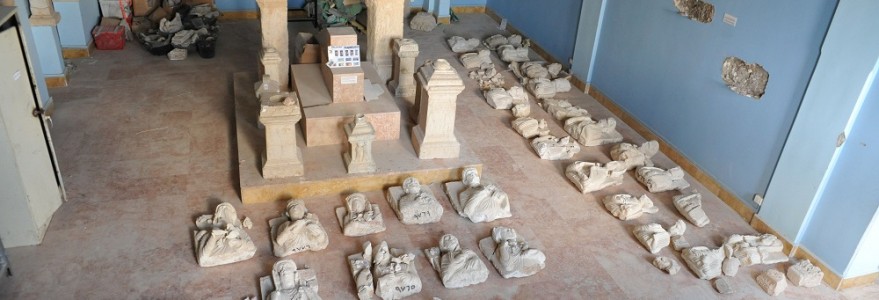Two Polish specialists representing the Polish Centre of Mediterranean Archaeology, University of Warsaw visited Palmyra just a few days after it has been taken over from the ISIS by Syrian government forces. Conservator, Bartosz Markowski and archaeologist, Robert Żukowski were there from April 8th till April 14th, following an invitation extended to the PCMA by the Syrian Directorate General of Antiquities and Museums. They were the first foreign experts to reach the city.
They presented their observations on the state of Palmyra’s antiquities during a press conference on 20th April 2015.
The goal of their mission was to make an initial assessment of destructions in Palmyra, especially to the reliefs and sculptures in the Museum of Palmyra, that have been excavated and conserved by Polish experts. It was Bartosz Markowski, who conserved the famous relief of the Lion of Allat, one of Palmyra’s hallmarks, discovered by Polish archaeologists.
An archaeological expedition from the PCMA worked in Palmyra from 1959 till 2011, when all work by foreign missions had to be suspended due to the outbreak of atrocities. Palmyra’s ancient monuments became the object of intentional attacks after the city has been captured by ISIS in 2015.
After it had been retaken by the government forces in the last days of March 2016, images of the actual damages to Palmyra’s antiquities appeared, among them of the Palmyra Museum, holding sculptures excavated and conserved by the PCMA mission. It became clear that in order to save these objects, instant action must be taken, to preserve what has survived of them. Expertise of archaeologists and conservators who had worked with these objects was of essence for their future reconstruction.
Polish Centre of Mediterranean Archaeology, University of Warsaw coordinates Polish archaeological research in the Eastern Mediterranean since 1959 (since 1990 under the present name). In recent years it broadened its scope of interest into the Arabian Peninsula and the Caucasus. Currently about 30 projects in Egypt, Sudan, Cyprus, Lebanon, Iraqi Kurdistan, Jordan, Kuwait, Saudi Arabia, Oman, Georgian and Armenia.



